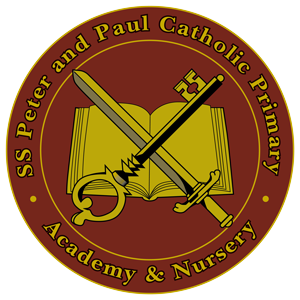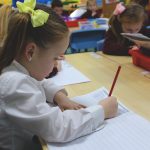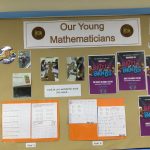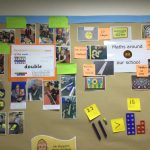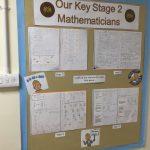Intent
The 2014 National Curriculum for Maths aims to ensure that all children:
- Become fluent in the fundamentals of mathematics, including through varied and frequent practise with increasingly complex problems over time, so that pupils have conceptual understanding and are able to recall and apply their knowledge rapidly and accurately to problems
- Reason mathematically by following a line of enquiry, conjecturing relationships and generalisations, and developing an argument, justification or proof using mathematical language
- Can solve problems by applying their mathematics to a variety of routine and non-routine problems with increasing sophistication, including breaking down problems into a series of simpler steps and persevering in seeking solutions.
At SS Peter and Paul, we believe that all pupils can achieve in mathematics given the correct resources, support and teaching environment. As a school, we ensure all children feel challenged and have sustained opportunities to deepen their level of understanding and application in each lesson. We are committed to ensuring that children are able to recognise the importance of maths in everyday life and apply their skills to real-life contexts. Resilience is encouraged in maths – helping them realise that making a mistake is the path to learning something new. Through this, we develop the children’s curiosity about the subject and the variety of ways answers can be calculated. The curriculum is adapted to support the children’s needs to ensure there is a secure understanding of previous learning before moving on.
Implementation
Our Mathematics’ curriculum is split into year group specific units that are taught following our long term and medium term plans. These are adapted throughout the year based on continuous assessment to reflect the children’s needs. The sequence of learning is to ensure that a secure understanding of place value/number is in place before attempting the four operations. Therefore, the children can start to create links and understand how they can use their learning from each unit to deepen their understanding. There are opportunities to revisit learning throughout the year in ‘consolidation’ weeks to ensure that children are revisiting skills learnt and these become embedded. Children complete session starters at the beginning of each lesson, which also reactivates and consolidates previous knowledge and skills in Maths.
Teachers will create their lesson objectives from the medium term plan and ensure that there are sequenced steps that children can work through to achieve their deeper understanding of the skill (objectives) being taught. This is taught in an ‘I do, We do, You do’ approach with children provided with a variety of scaffolds, if needed, to support their learning.
Children’s independent learning as a skill is taught and encouraged so that children will then start to understand when to move on to the next task to ensure that they are constantly challenging themselves. This works in conjunction with the teachers providing immediate assessment for learning and supporting and teaching where needed through live marking. Practical resources are available for children to use when needed to support their learning including: Numicon, Base 10, number squares, number lines, Number Blocks and place value counters. Children are expected to answer questions thoughtfully using mathematical vocabulary in their reasoning. You will see the mathematical vocabulary relevant to their current unit displayed on the classroom’s working wall and introduced at the start of each lesson.
Children have the opportunity to improve their recall of number facts through online activities on NumBots and Times Tables Rockstars, which is a weekly homework expectation. This supports the children in their maths lessons by helping them to perform calculations quickly, and to be flexible in their mathematical strategy. These are all skills that we feel are incredibly important in ensuring children are successful in the understanding of mathematics.
Teachers are not tied to one scheme, as our children like variety and excitement in their maths lessons including practical lessons. You will see a range of planning tools used by staff providing children with a range of age-relevant pictorial, concrete and abstract questions, but the consistent high expectation will be evident across.
Impact
Children at SS Peter and Paul enjoy mathematics – they understand the value and importance it will play in their lives. This is clear through pupil voice, engagement in lessons and the atmosphere in a classroom.
We want our children to be confident in making connections across mathematical ideas as a result of developing their fluency, reasoning and solving increasingly contextual problems. We want to give them the best start to their mathematical journey, preparing them for life and for some a career in mathematics by developing their curiosity for the subject.
Through high quality teaching, guidance and effective feedback children will make fantastic progress from EYFS to the end of Key Stage Two.
Summative assessment will take place at the end of each term as an opportunity for the children to show they can apply their skills learnt independently and this is used to inform teacher assessment. In Years 2 and 6, end of year assessments are completed and children’s outcomes are discussed in pupil progress meetings by the class teachers and senior leadership. Formative assessment takes place on a lesson by lesson basis by the teacher and teaching assistant and planning/tasks are adjusted accordingly to meet the individual or class’s needs.
The impact our mathematics’ curriculum has on our children:
– Children are enthusiastic learners and experience a wide-range of learning whilst always feeling challenged.
– Children of all abilities and backgrounds achieve well in mathematics and feel the sense of success, reflected in their progress.
– Children enhance their mathematical vocabulary and are able to use these in context when explaining their mathematical reasoning.
– Children can apply their learning to a variety of problems, including verbalising the mathematics they are using and why.
– Children are prepared for ‘real life maths’.
Documents
- Addition and Subtraction.pdf pdf374.4 KbSep 3rd, 2023
- Algebra.pdf pdf274.2 KbSep 3rd, 2023
- EYFS Maths Curriculum Progression SSPP.pdf pdf525.3 KbJan 22nd, 2025
- Fractions.pdf pdf571.9 KbSep 3rd, 2023
- Geometry Position and Direction.pdf pdf179.3 KbSep 3rd, 2023
- Geometry Properties of Shape.pdf pdf368.7 KbSep 3rd, 2023
- LTP Maths.pdf pdf651.6 KbOct 20th, 2023
- Measurement.pdf pdf635.9 KbSep 3rd, 2023
- Multiplication and Division.pdf pdf620.8 KbSep 3rd, 2023
- Number.pdf pdf515.6 KbSep 3rd, 2023
- Ratio and Proportion.pdf pdf120.8 KbSep 3rd, 2023
- Statistics.pdf pdf167.7 KbSep 3rd, 2023
- Vocabulary Progression Document.pdf pdf1.1 MbApr 24th, 2023
